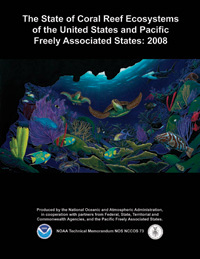U.S. coral reefs in trouble
U.S. coral reefs in trouble
mongabay.com
July 7, 2008
Related: 1/3 of corals face extinction
|
|
Nearly half of U.S. coral reefs are in “poor” or “fair” condition according to a new study by the National Oceanic and Atmospheric Administration (NOAA).
The report, The State of Coral Reef Ecosystems of the United States and Pacific Freely Associated States: 2008, says that coral reefs face an onslaught of threats from coastal development, fishing, sedimentation and recreational activities. Climate-related effects of coral bleaching, disease and ocean acidification also pose a risk to coral health.
“NOAA’s coral program has made some significant progress since it was established 10 years ago, but we need to redouble our efforts to protect this critical resource,” said NOAA administrator Conrad C. Lautenbacher Jr.

|
The report was released at the 11th International Coral Reef Symposium in Fort Lauderdale, Florida. It reviews the conditions of reefs in the U.S. Virgin Islands, Puerto Rico, Navassa Island, southeast Florida, the Florida Keys, Flower Garden Banks, the Main Hawaiian Islands, the Northwestern Hawaiian Islands, American Samoa, the Pacific Remote Islands, the Republic of the Marshall Islands, the Federated States of Micronesia, the Commonwealth of the Northern Mariana Islands, Guam and the Republic of Palau.
“The report shows that this is a global issue,” said Tim Keeney, deputy assistant secretary of commerce for oceans and atmosphere and co-chair of the United States Coral Reef Task Force. “While the report indicates reefs in general are healthier in the Pacific than the Atlantic, even remote reefs are subject to threats stemming from climate change, as well as illegal fishing and marine debris.”
The report notes that two species of coral — Elkhorn and Staghorn corals — have become the first corals ever listed as threatened under the Endangered Species Act. It also highlighted the importance of healthy coral reefs in protecting coastal areas from storm damage and the massive Indian Ocean tsunami of 2004.
Findings from the report:
- Approximately half of the coral reef ecosystem re-sources under U.S. or FAS jurisdiction are considered by scientists to be in ‘poor’ or ‘fair’ condition and have declined over time due to several natural and anthropogenic threats.
- Reef habitats adjacent to populated areas tend to experience more intense threat levels related to issues like coastal development and recreational use, but even remote reefs far from human settlements are imperiled by illegal fishing, marine debris, and climate-related impacts such as bleaching, disease and acidification.
- The majority of key resources in the Caribbean/Atlantic/Gulf of Mexico region were reported to be in poor or fair condition. Only 6 of the 24 responses (25%) reported conditions were good (4) or excellent (2).
- Of the six jurisdictions in the Caribbean/Atlantic/Gulf of Mexico region, the most remote jurisdiction, the Flower Garden Banks, had the fewest high threats (1), and all four key resources were reported to be in good or excellent condition.
- In the Pacific, the majority (69%) of key resources (for which condition was known) were reported to be in good (16) or excellent (8) condition.
The State of Coral Reef Ecosystems of the United States and Pacific Freely Associated States: 2008